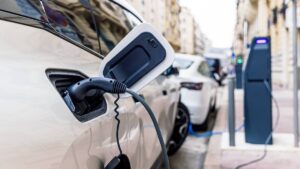MTA Report: Governments need to step up to drive electric vehicle adoption

Pic: DKosig / iStock / Getty Images Plus via Getty Images
Government intervention is required in order to increase the uptake of electric vehicles in Australia but the moves by various state governments seem to be steps in the wrong direction.
In its new 2021 Industry Report, the Motor Trades Association of Australia said that for the first time in modern history, the automotive industry is at a revolutionary turning point.
This turning point encompasses the transition to zero emissions vehicles over the next decade as well as the integration of EVs as assets within the electricity generation and transmission sector that can help stabilise the electricity network in times of peak demand.
Proponents have latched on to the potential for EVs to help reduce greenhouse gas emissions and called on Australia to introduce subsidies that reduce the cost of EV ownership.
Meanwhile, the MTAA pointed to recent analysis on the uptake of EVs in China, Norway and the US that found that investing in electric charging stations appeared to be more effective than subsiding consumer purchases to promote EV sales from a cost effectiveness perspective.
One step backwards
However, some Australian state governments do not seem to be enthusiastic about helping drive EV ownership with Victoria introducing plans to make EV owners pay a road use tax of 2.5c per km that they drive.
New South Wales has also signalled that it was also considering a distance-based tax on EVs.
To top it off, the MTAA added that there is “considerable apprehension” amongst consumers and businesses that the Federal Government would impose its own tax regime on low emissions vehicles, which could be a major disincentive for the uptake of EVs.
Comments such as those from Energy and Emissions Reduction Minister Angus Taylor, who (in)famously said he would not drive EVs as he required a large, fossil-fuelled SUV to cover the large distances he travels, certainly do not inspire any confidence that the Federal Government won’t do so.
The MTAA also noted that governments had a duty and obligation to understand the impact that EVs would have on Australia’s automotive industry as they would require “significant investment from dealers and automotive workshops in both equipment and skills training”.
Electric vehicles support
However, there is hope that not all state and territory governments are looking to tax EVs.
The Australian Capital Territory government is offering residents and businesses two years of free car registration when they buy EVs as it looks to slash carbon emissions.
This adds to the stamp duty exemption that EVs already enjoy in the territory.
“Transport emissions now account for around 60 per cent of the ACT’s greenhouse gas emissions and of these emissions an estimated 70 per cent are from private vehicles,” ACT Minister for Climate Action Andrew Barr said.
“Reducing the number of high-emitting vehicles on our roads is significant to achieving our targets along with encouraging active travel and public transport use.”
Related Topics
UNLOCK INSIGHTS
Discover the untold stories of emerging ASX stocks.
Daily news and expert analysis, it's free to subscribe.
By proceeding, you confirm you understand that we handle personal information in accordance with our Privacy Policy.








